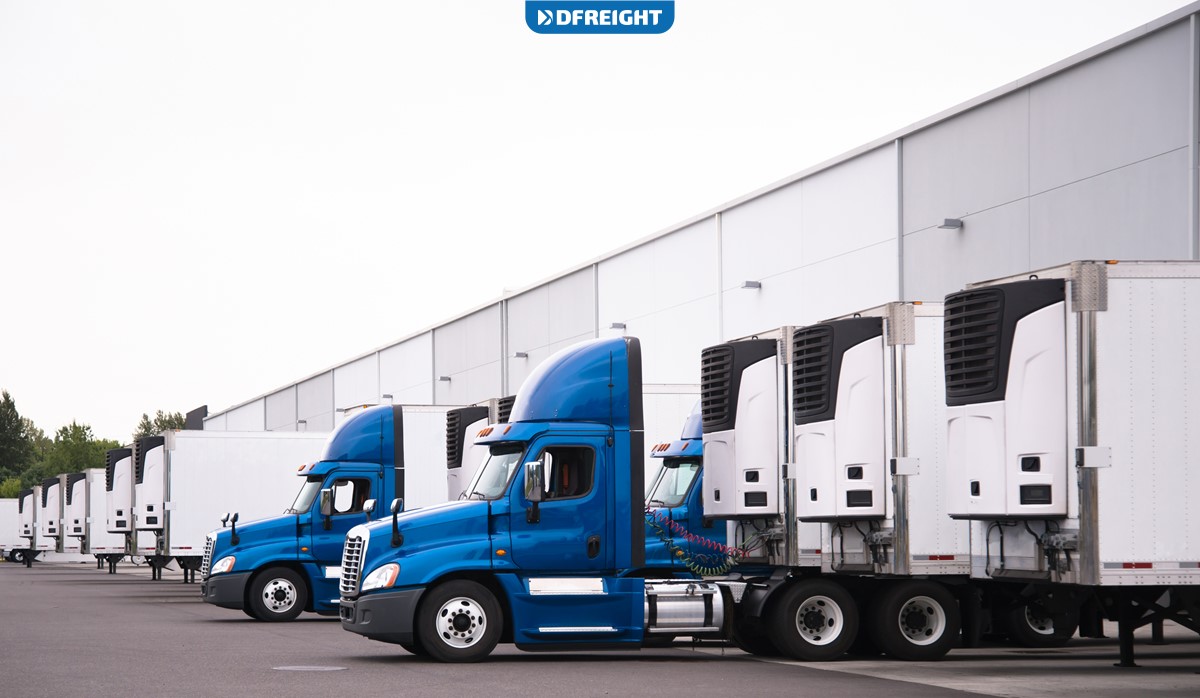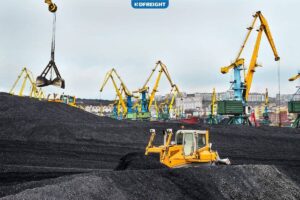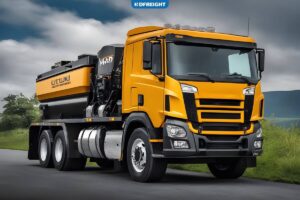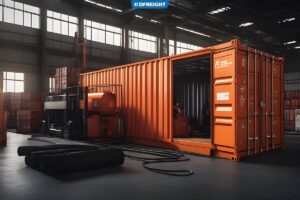Have you ever wondered how perishable goods are transported across long distances? The answer is reefer trailers! They are refrigerated trailers that are used to transport perishable goods. They are equipped with a system that regulates the temperature and humidity inside the trailer. In this blog post, we will take a closer look at reefer trailers and their importance in the cold chain industry. We will also discuss the challenges associated with reefer trailers and introduce you to some of the leading manufacturers. So, if you’re interested in learning more about reefer trailers, please read on!
Table of Contents
Reefer Trailer: a Brief Overview
A reefer trailer is a refrigerated Semi-trailer. The word “reefer” comes from the word “refrigerator.” A reefer trailer is used to keep perishable items cool or frozen. It has a refrigeration unit on the front of the trailer. The refrigeration unit cools the air inside the trailer. The reefer trailer has a thermostat that controls the temperature inside the trailer. It also has a fan that circulates the air inside the trailer and a backup power source in case of a power outage.
The reefer trailer is connected to the tractor with a fifth wheel and has a door on the front of the trailer. The door is used to access the refrigerated compartment. It also has a rear door to access the refrigerated compartment. The reefer trailer also has a ramp on the rear of the trailer used to load and unload the trailer.
The History of Reefer Trailers
In the early days of trucking, reefer trailers were used to haul perishable goods like produce and dairy products. These trailers were equipped with an ice-storage system that could keep the cargo cool for days at a time. The first reefers were built in the 1930s and quickly became an essential part of the trucking industry.
In the 1950s, the introduction of refrigerated trailers revolutionized the trucking industry, as these trailers could keep perishable goods cold for weeks at a time. This allowed truckers to haul cargo across the country without worrying about it going bad. Today, these trailers are still used to haul perishable goods, but they are also used to transport a variety of other items, including flowers, pharmaceuticals, and even live animals.
This is part of cold chain logistics, a technology and method that enables the secure transportation of temperature-sensitive products across the entire supply chain.
Different Parts of a Reefer Trailer
Reefer trailers come in a wide range of sizes, although most are 53 feet long. They obviously have more parts than regular cargo trailers do. These parts consist of:
- Trailer Refrigeration Unit (TRU): The TRU is a self-contained refrigeration unit that has its own diesel fuel supply from a tank located underneath the trailer. It also has a small diesel engine and a refrigerant compressor. This device cycles as necessary to maintain the preset temperature while monitoring the inside temperature of the trailer compartment(s).
- Insulated Container: Foam insulation is used to insulate the walls of reefer trailers, and the doors seal tightly to keep out air. This guarantees that the temperature stays the same for the duration of the journey.
- A Chute for Air: Reefer trailers need adequate air flow to keep the interior at a steady temperature, which calls for air to move freely throughout the trailer. The inner ceiling of some reefers is attached with an air supply duct because of this. Air is distributed from the front of the trailer to the back via this chute. The majority of reefers also include metal channels in the floor that make room for air to flow uniformly underneath the cargo being transported.
- Temperature Regulator: From a control panel on the driver’s side of the TRU, the temperature is controlled and set in accordance with the needs of the consumer. A TRU can provide heating in addition to cooling if necessary to keep the freight at the proper temperature.
- Air Ride Suspension: A TRU air ride suspension typically consists of airbags located at each corner of the unit. The airbags are inflated and deflated by a compressor and air tank system controlled by the driver. The air pressure in the bags can be adjusted to level the unit and provide a smoother ride.
Additionally distinctive, reefer trailers need gasoline on top of the fuel required for the truck. The fuel capacity of reefer tanks is about 50 gallons. However, a trucker’s driving style has no impact on the fuel consumption of a reefer trailer due to its closed system.
How Does a Trailer Refrigeration Unit Work?
A reefer unit is a refrigerated container used to transport perishable goods. It is equipped with a refrigeration system that maintains a temperature between -40°F and 80°F. The system is controlled by a thermostat and operated by a diesel engine which burns fuel to generate the power needed to run the refrigeration system. The reefer unit also has a ventilation system that circulates air and prevents the buildup of condensation inside the container. The reefer unit is typically mounted on a chassis and can be transported by truck, train, or ship.
Components of a Trailer Refrigeration Unit
Reefer units are refrigerated trailers that are used to transport perishable goods. They are equipped with a system that regulates the temperature and humidity inside the trailer. The system is controlled by a thermostat and a humidity sensor. It also has a backup power source in case of a power outage. Key components of a reefer unit include:
- The Compressor: A tiny engine powers the compressor, which draws in and compresses the gaseous refrigerant to liquefy it and release heat.
- The condenser: The liquid from the compressor enters the condenser for heat exchange, filling the tubing all the way to the attached fins. Similar to how radiators function, these fins assist in cooling the outside air that passes through the condenser.
- The Evaporator: When the liquid has cooled, it passes through the metering valve of the trailer’s evaporator, which regulates cooling. The finned coils around the liquid refrigerant heat it up as it expands and turns back into a gas. The compressor is used to restart the cooling cycle after the evaporator is exposed to the cooled air inside the trailer.
The Challenges Associated With Reefer Trailers
Reefer trailers are one of the most versatile types of trailers on the market, but they come with their own unique set of challenges. Chief among these is the need to maintain a consistent temperature inside the trailer, which can be challenging to do in hot or cold weather. If the temperature inside the trailer gets too hot or too cold, it can damage the cargo and cause it to spoil. This is why reefer trailers are equipped with special cooling and heating units that must be carefully monitored and maintained.
Another challenge is that they are often used to transport perishable goods, which means they need to be cleaned and sanitized regularly. This can be time-consuming and labor-intensive, but keeping the trailer in good condition is essential.
Finally, reefer trailers can be expensive to operate and maintain, so it is essential to carefully consider whether or not one is right for your business before investing. With careful planning and management, however, a reefer trailer can be a valuable asset to any business that needs to transport temperature-sensitive goods.
Key Reefer Trailer Manufacturers
There are many reefer trailer manufacturers, but some of the most popular brands include Great Dane, Utility, and Wabash. These brands offer a variety of features and options that allow users to customize their trailers to meet their specific needs.
- Great Dane: Great Dane is one of the leading brands of refrigerated trailers in the United States. The company has been manufacturing trailers for over 50 years and has a reputation for quality and durability. Great Dane’s reefer trailers are available in a variety of sizes and configurations to meet the needs of any business. All of Great Dane’s reefer trailers are equipped with the latest in refrigeration technology to ensure that your products are kept at the perfect temperature.
- Utility: In the early days of refrigerated transportation, Utility was one of the first companies to develop a reefer trailer that could be used to transport perishable goods. Utility is today one of the most popular brands in North America. Utility reefer trailers are known for their quality and durability and are a popular choice for businesses that need to transport perishable goods.
- Wabash: Wabash National Corporation is the largest producer of dry van trailers, platform trailers, and liquid transportation systems in North America. The company was founded in 1985 with a vision to be the best provider of transportation solutions in the market. Wabash has continued to innovate and lead the way in refrigerated trucking for many years until they were eventually eclipsed by newer brands like Thermo King and Carrier.
The Future of Reefer Trailers
The reefer trailer is an integral part of the transportation industry, and its future is likely to be very bright. The demand for reefer trailers is expected to continue to grow as the transportation of perishable goods becomes more and more common.
There are a few factors that will impact the future of reefer trailers. First, the technological advances that are being made in the transportation industry are likely to make reefer trailers more efficient and reliable. This will make them even more essential for businesses that transport perishable goods. Additionally, the growth of the global economy is likely to lead to more international trade, which will also increase the demand for reefer trailers.
Get Your Temperature-Sensitive Products Shipped with DFreight
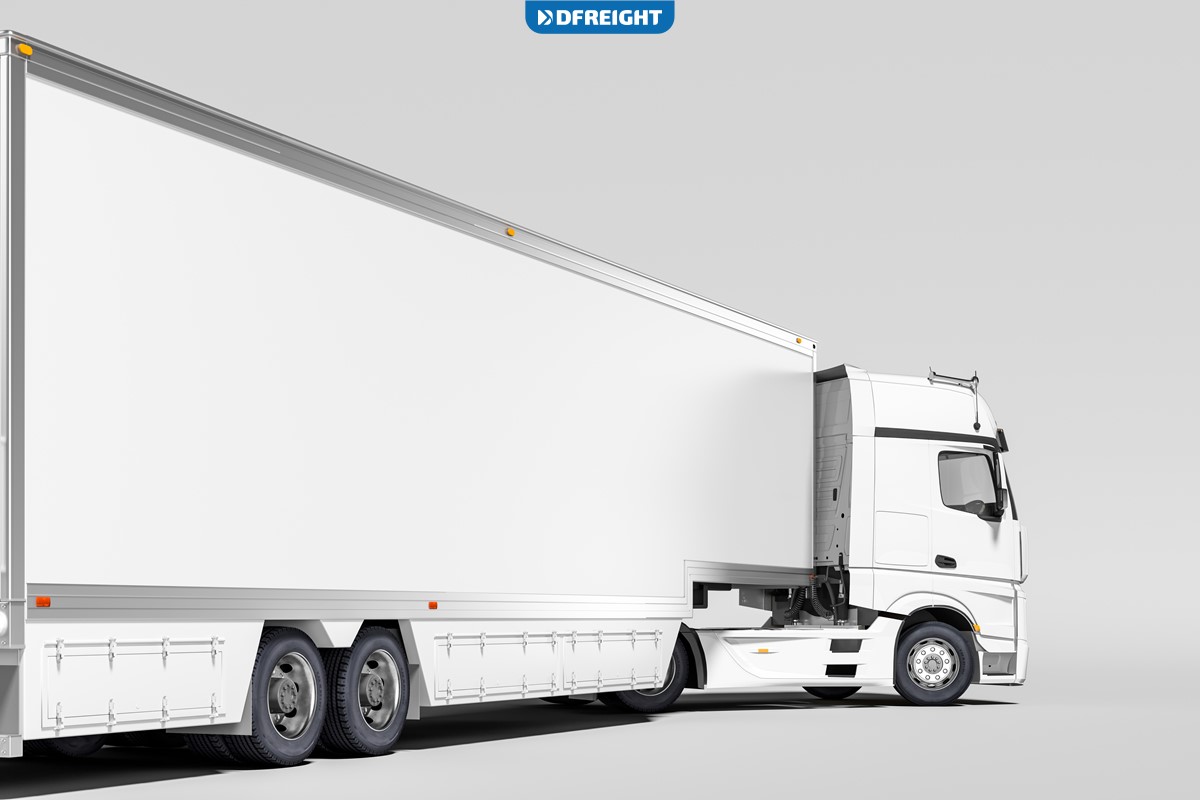
As the world becomes more connected, the need to transport temperature-sensitive goods across long distances becomes more and more common. This is where reefer trailers come in. Reefer trailers are refrigerated trailers that are used to transport perishable goods. They are equipped with a system that regulates the temperature and humidity inside the trailer.
DFreight is a leading freight forwarder in the UAE that specializes in shipping a wide variety of goods including temperature-sensitive products. We have a team of experts who are skilled in handling reefer trailers and ensuring that the goods are transported safely and securely. If you need to transport temperature-sensitive goods, please don’t hesitate to contact us. We would be happy to discuss your needs and provide you with a quote.
FAQs
What is a reefer trailer?
A reefer trailer is a refrigerated Semi-trailer used to keep perishable items cool or frozen. It has a refrigeration unit on the front of the trailer which cools the air inside the trailer.
What are reefer trailers’ origins?
In the early days of trucking, reefer trailers were used to haul perishable goods like produce and dairy products. These trailers were equipped with an ice-storage system that could keep the cargo cool for days at a time. The first reefers were built in the 1930s and quickly became an essential part of the trucking industry.
What are the challenges associated with reefer trailers?
The challenges associated with reefer trailers include the need to maintain a consistent temperature inside the trailer, the need to regularly clean and sanitize the trailer, and the high cost of operation and maintenance.
What are some of the leading manufacturers of reefer trailers?
Some of the key manufacturers of reefer trailers include Great Dane, Utility, and Wabash.
